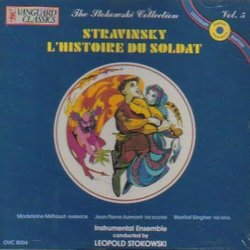| All Artists: Igor Stravinsky, Leopold Stokowski, Loren Glickman, Charles Russo, Julius Levine, Raymond des Roches, John Swallow, Martial Singher, Madeleine Milhaud, Jean Pierre Aumont Title: Stravinsky: L'Histoire du Soldat (The Stokowski Collection) Members Wishing: 0 Total Copies: 0 Label: Vanguard Classics Release Date: 4/8/1993 Genre: Classical Style: Number of Discs: 1 SwapaCD Credits: 1 UPC: 723918800424 |
Search - Igor Stravinsky, Leopold Stokowski, Loren Glickman :: Stravinsky: L'Histoire du Soldat (The Stokowski Collection)
 | Igor Stravinsky, Leopold Stokowski, Loren Glickman Stravinsky: L'Histoire du Soldat (The Stokowski Collection) Genre: Classical
|
Larger Image |
CD DetailsSimilar CDs |
CD ReviewsFor Stokowski more than for the theatrical experience Discophage | France | 02/19/2010 (4 out of 5 stars) "First, the sound: the recording was made in 1967 and Vanguard was then an audiophile label. The transfers were done with admirable care and dedication and sound stupendous, with hardly any tape hiss, through no application of any noise reduction process but just the use of state-of-the-art equipment, including "the same type of Ampex 300 series vacuum recorded on which it was originally recorded".
Then: Stokowski and his seven instrumental players. Great conducting, great playing, crisp, biting, dynamic, close in tempos to the model established by the composer himself in his two American recordings of the instrumental Suite (1954 is on Stravinsky Conducts Stravinsky: The Mono Years 1952-1955, I have 1961 on the original 22-CD set, Igor Stravinsky: The Recorded Legacy), except for the three dances of the Princess, where Stokowski takes his time), and with every instrument coming out in entire clarity. This is a joy to listen to with score. I am not so happy with the actors, though. Like the 1952 premiere recording by Fernand Oubradous, which I've just reviewed (Les Rarissimes de Fernand Oubradous: Stravinsky; Mozart; Grétry), this version (in French) follows precisely the Chester edition, rather than reinserting elements from playright Ramuz' original book (as in the famous 1962 recording with Cocteau and Ustinov under Markevitch, Stravinsky: Histoire du Soldat [Germany]), which is not exactly the same as the text featured in the performing score; it doesn't reattribute either to the Soldier some of the lines that the score assigns to the Narrator ("Lecture", it is called in the score, "Reading"), as many versions do (for instance Igor Stravinsky: The Soldier's Tale (Histoire de Soldat / Geschichte vom Soldaten) - Vanessa Redgrave / Sting / Ian McKellen / The London Sinfonietta / Kent Nagano). But there are a quite a few cuts in Madeleine Milhaud's narrator text. For instance, like those photos from the Stalin era in Soviet Union where political leaders fallen from favor (and ended in the Gulag, when not with a bullet in the neck) have been entirely erased, the Inn mate who encourages the soldier to go and wake up the sleeping princess has entirely disappeared. Whether one accepts Madeleine Milhaud as a Narrator will be a matter of taste. Not that she is inexpressive or bland, on the contrary (she was an actress before marrying composer Darius Milhaud) - although, had I been the director of those recording sessions, I would have asked her to put less air between her phrases; she has a tendency to pause after each line (and those lines are short, quasi-verses) , bogging down the rhythm. But, in Ramuz' very peculiar writing, the Narrator delivers many of the Soldier's lines, and some of the Devil's as well. So a woman will never be as entirely convincing as a man. Also, I find that she has less of a unique vocal color and character than Cocteau, and is less committed than Jean Marchat in Oubradous' recording. Jean-Pierre Aumont as Soldier and Martial Singher as Devil I find miscast. Singher has a juvenile voice that would be better suited for the soldier (and is somewhat too elegant for the Devil, although I can very well imagine a non-traditional, non-caricature take on the Devil that would be elegant in such a way), and Aumont has the voice of an older man. So, sure, you can fancy a gruff, seasoned Soldier - a Sergeant-instructor, rather - and a juvenile and elegant sounding Devil, but it does take quite a stretch of the imagination, and isn't entirely convincing as a purely audio experience. I also find that one thing is amiss and that is the stage indications. It will always be a problem in the Soldier's Tale as a purely audio experience, and here, somehow, I found it more bothersome than on the recording of Oubradous; with Markevitch, sensibly, Cocteau did speak out loud some of those stage indications. Here, with purely the lines and no indication of the action they illustrate, some of that stage action and some of those lines become simply incomprehensible. For instance, when the Devil returns disguised as an old woman selling cheap wares, and hands the Soldier a violin; the Soldier tries to play, but can draw no sound from the instrument. In despair, he throws it away, tears the book in shreds. All this silent stage action is to take place during a repeat of the music that was first associated with the Soldier's playing of the violin. Here, you get no clue of what is happening, the music just starts after the Devil's last line, so you get the sonic impression that the soldier has just seized the violin and resumed played. That's the opposite of what it is all about! The liner notes do come with a detailed synopsis, but it means the recording doesn't stand entirely on its own. The disc is well-cued (unlike Oubradous, which absurdly gets just its beginning cue). TT 54:44 (and not 53:44 as indicated on the back cover). In conclusion, I will dispute the liner notes contention that "no one familiar with the full version (...) can find the suite version adequate". I find this version valuable more for Stokowski's conducting than for the purely theatrical experience. For that, go to Oubradous, Markevitch or, in English, to Redgrave-Sting-Nagano. Note that the three actors were French, but had made a life and career in the US (Martial Singher as a Met stalwart, Jean-Pierre Aumont on Broadway and in Hollywood, and Madeleine Milhaud with her cousin and husband Darius in California). Simultaneously with this French version, they recorded a version in English - a unique case in the history of recording, I should think. It has also been reissued by Vanguard, fist as a normal CD, L'Histoire Du Soldat, than recently as an hybrid SACD: Stravinsky: L'Histoire du Soldat [Hybrid SACD]. Madeleine Milhaud passed away on January 17, 2008, at the venerable age of 105. " |

 Track Listings (16) - Disc #1
Track Listings (16) - Disc #1
